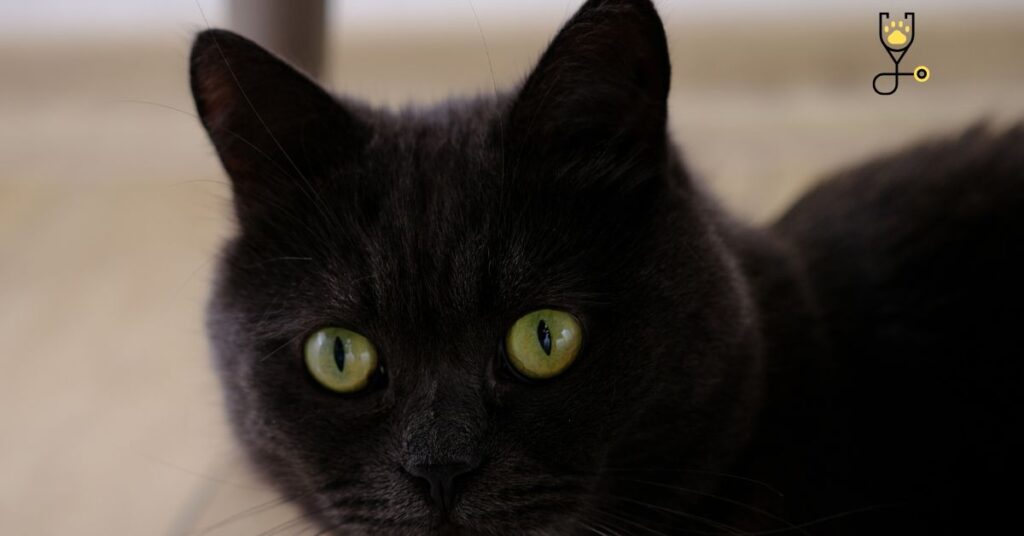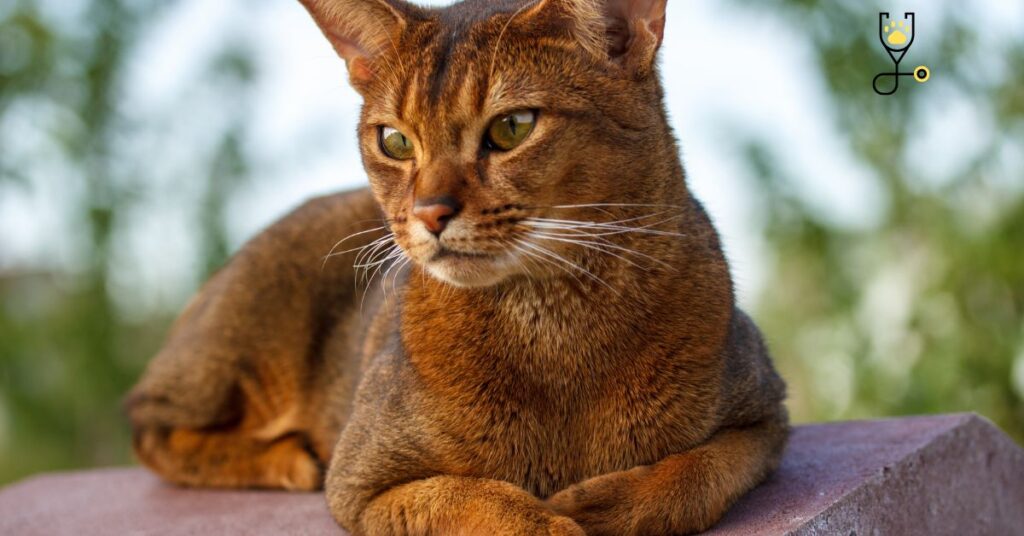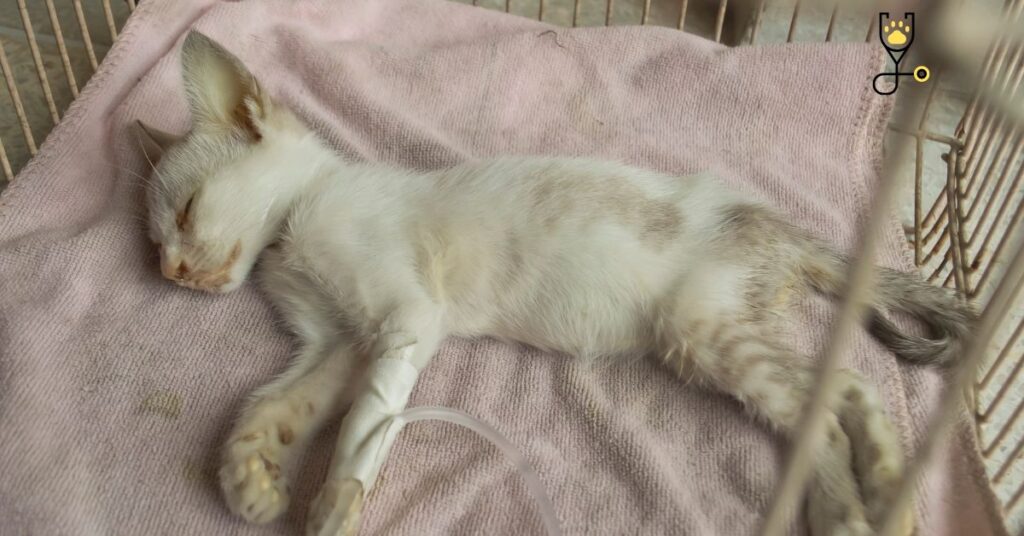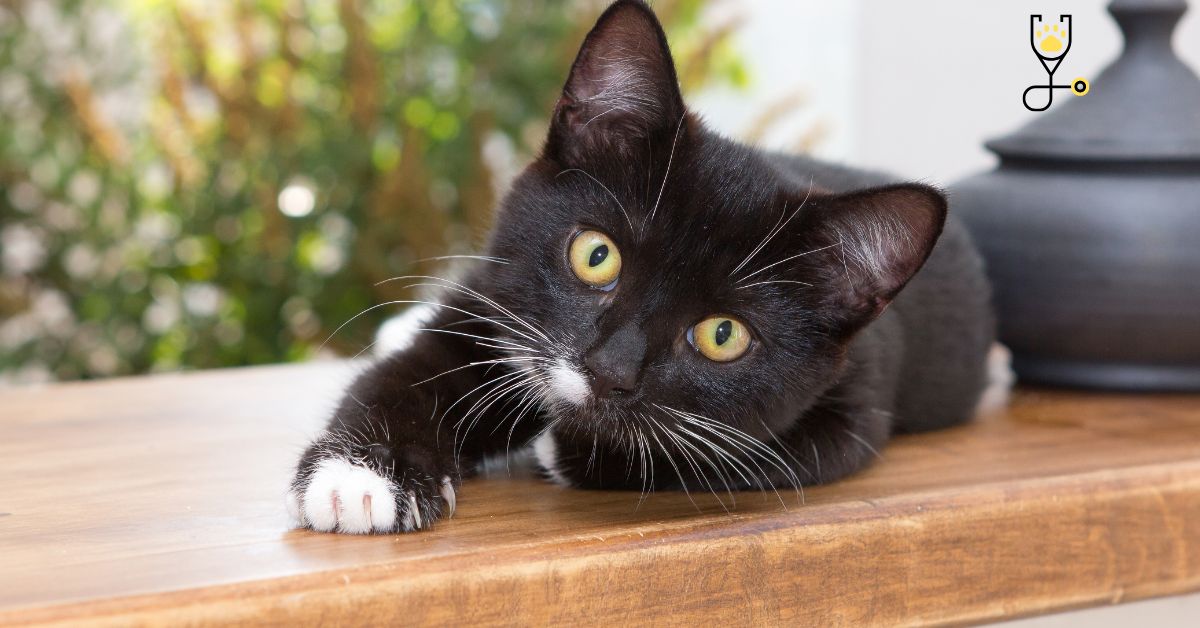Kittens are adorable balls of fluff, but they can also be prone to various health problems. One such problem is jaundice, a condition that can cause the kitten’s skin and eyes to turn yellow. In this article, we’ll explore the causes, treatment, and prevention of jaundice in kittens. So if you’re a kitten lover or owner, keep reading!
What is the meaning of jaundice in cats?
Jaundice is a condition caused by an increase in the level of bilirubin in the blood.
- Bilirubin is a yellow pigment that is produced when red blood cells are broken down. When there is too much bilirubin in the blood, it can build up in the tissues and cause them to turn yellow.
What are the signs and symptoms of jaundice in kittens?

1. Yellow discoloration of the skin and eyes: This is the most common and obvious symptom of jaundice. The affected areas will appear yellow, and in severe cases, the whites of the eyes may also turn yellow.
2. Lethargy: If your kitten is tired and lazy, it could be a sign of jaundice.
3. Loss of appetite: A loss of appetite is another common symptom of jaundice in kittens.
4. Weight loss: If your kitten is losing weight, it could be due to jaundice or another underlying health condition.
5. Vomiting: Vomiting can also be a symptom of jaundice in kittens.
6. Diarrhea: Diarrhea is another possible symptom of jaundice.
7. Pale gums: If the gums appear pale, it could be a sign of anemia, which can be caused by jaundice.
8. Dark urine: If your kitten’s urine is dark in color, it could be a sign of liver damage or other underlying health problems.
9. Yellowish-brownish feces: If the feces are yellow or brown, it could be a sign of jaundice.
What causes jaundice in kittens?
There are several potential causes of jaundice in kittens, including:
1. Anemia: Anemia is a condition in which there is a decrease in the number of red blood cells. This can be caused by various underlying health conditions, such as leukemia or parasites. Anemia can also be caused by blood loss, such as from surgery or an injury.

2. Liver disease: Liver disease is another possible cause of jaundice in kittens. Liver disease can be caused by various factors, including infection, inflammation, and toxins.
3. Kidney disease: Kidney disease can also lead to jaundice in kittens. This is because the kidneys are responsible for filtering bilirubin from the blood. If the kidneys are not functioning properly, bilirubin can build up in the blood and cause jaundice.
4. Parasites: Parasites, such as worms, can also cause jaundice in kittens. This is because parasites can damage the liver and/or cause anemia.
5. Infection: Infections, such as viruses or bacteria, can also lead to jaundice in kittens.
6. Tumors: Tumors, both benign and malignant, can also cause jaundice in kittens. This is because tumors can damage the liver or block the bile ducts, which can lead to a build-up of bilirubin in the blood.
How is jaundice treated in kittens?
The treatment for jaundice will depend on the underlying cause.

- If the jaundice is caused by anemia, your veterinarian will treat the anemia. This may involve giving your kitten transfusions of red blood cells or iron supplements.
- If the jaundice is caused by liver disease, your veterinarian will treat the liver disease. This may involve giving your kitten medications or special diets.
- If the jaundice is caused by kidney disease, your veterinarian will treat the kidney disease. This may involve giving your kitten fluids or medications.
- If the jaundice is caused by parasites, your veterinarian will treat the parasites. This may involve giving your kitten deworming medication.
- If the jaundice is caused by an infection, your veterinarian will treat the infection. This may involve giving your kitten antibiotics or other medications.
- If the jaundice is caused by a tumor, your veterinarian will treat the tumor. This may involve surgery, radiation therapy, or chemotherapy.
Preventions of jaundice in kittens
There are several things you can do to help prevent jaundice in kittens, including:
1. Keeping your kitten up-to-date on vaccinations: This will help protect your kitten from infections, which can lead to jaundice.
2. Feeding your kitten a balanced diet: A healthy diet will help keep your kitten’s liver and kidneys functioning properly.
3. Avoiding toxins: Toxins, such as chemicals and drugs, can damage the liver and lead to jaundice.
4. Regular check-ups with your veterinarian: This will help ensure that any underlying health conditions are caught early and treated before they lead to jaundice.
5. Keeping your kitten indoors: This will help protect your kitten from parasites, which can lead to jaundice.
Jaundice can be a serious condition in kittens and can lead to other health problems if it is not treated. If you think your kitten may have jaundice, please take them to see a veterinarian as soon as possible.
Prognosis of jaundice in kittens
The prognosis for jaundice in kittens will depend on the underlying cause. If the jaundice is caused by anemia, the prognosis is usually good with treatment. If the jaundice is caused by liver disease, the prognosis depends on the severity of the liver disease. If the jaundice is caused by kidney disease, the prognosis also depends on the severity of the kidney disease. If the jaundice is caused by parasites, the prognosis is good with treatment. If the jaundice is caused by an infection, the prognosis also depends on the severity of the infection. If the jaundice is caused by a tumor, the prognosis will depend on whether or not the tumor is malignant.
Jaundice can be a serious condition in kittens and can lead to other health problems if it is not treated. If you think your kitten may have jaundice, please take them to see a veterinarian as soon as possible.
Conclusion
Jaundice is a condition that can be caused by several different things in kittens. The most common causes are liver disease, anemia, and parasites. Jaundice can also be caused by kidney disease, infections, and tumors. Treatment for jaundice will depend on the underlying cause. There are also several things you can do to help prevent jaundice in kittens, such as keeping them up-to-date on vaccinations and feeding them a balanced diet. If you think your kitten may have jaundice, please take them to see a veterinarian as soon as possible.
Frequently Asked Questions
jaundice is a condition that causes the skin and whites of the eyes to turn yellow. Jaundice can be caused by several different things, including liver disease, anemia, and parasites.
The symptoms of jaundice include yellowing of the skin and whites of the eyes. Jaundice may also cause lethargy, appetite loss, and weight loss.
Jaundice is typically diagnosed based on physical examination and laboratory testing. Blood tests may be performed to check for liver damage or infection. A urine test may also be performed to check for kidney damage.
Treatment for jaundice will depend on the underlying cause. If the jaundice is caused by anemia, treatment may involve blood transfusions. If the jaundice is caused by liver disease, treatment may involve drugs to help protect the liver or surgery to remove a portion of the liver. If the jaundice is caused by kidney disease, treatment may involve dialysis or transplants. If the jaundice is caused by parasites, treatment may involve antiparasitic drugs. If the jaundice is caused by an infection, treatment may involve antibiotics. If the jaundice is caused by a tumor, treatment may involve surgery, radiation therapy, or chemotherapy.
The prognosis for jaundice in kittens will depend on the underlying cause. If the jaundice is caused by anemia, the prognosis is usually good with treatment. If the jaundice is caused by liver disease, the prognosis depends on the severity of the liver disease. If the jaundice is caused by kidney disease, the prognosis also depends on the severity of the kidney disease. If the jaundice is caused by parasites, the prognosis is good with treatment. If the jaundice is caused by an infection, the prognosis also depends on the severity of the infection. If the jaundice is caused by a tumor, the prognosis will depend on whether or not the tumor is malignant.
There are several things you can do to help prevent jaundice in kittens, such as keeping them up-to-date on vaccinations and feeding them a balanced diet. You should also take your kitten to see a veterinarian for regular check-ups.







